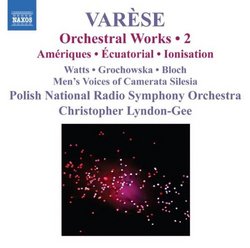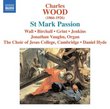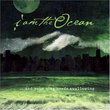| All Artists: Varese, Lyndon-Gee, Polish National Radio Symphony Orchestra Title: Varese: Orchestral Works Vol. 2 - Ameriques; Ecuatoria; Ionisation Members Wishing: 0 Total Copies: 0 Label: Naxos Original Release Date: 1/1/2008 Re-Release Date: 5/27/2008 Genres: Dance & Electronic, Pop, Classical Styles: Vocal Pop, Opera & Classical Vocal, Chamber Music, Historical Periods, Modern, 20th, & 21st Century, Symphonies Number of Discs: 1 SwapaCD Credits: 1 UPC: 747313288229 |
Search - Varese, Lyndon-Gee, Polish National Radio Symphony Orchestra :: Varese: Orchestral Works Vol. 2 - Ameriques; Ecuatoria; Ionisation
 | Varese, Lyndon-Gee, Polish National Radio Symphony Orchestra Varese: Orchestral Works Vol. 2 - Ameriques; Ecuatoria; Ionisation Genres: Dance & Electronic, Pop, Classical |
Larger Image |
CD DetailsSimilar CDs |
CD ReviewsOver-the-Top "Ameriques" Thomas F. Bertonneau | Oswego, NY United States | 06/25/2008 (5 out of 5 stars) "My acquaintance with Edgar Varèse goes back to the old Columbia stereo LPs of the early 1960s, with forces led, I believe, by Robert Craft. Varèse's was certainly the strangest music I had ever heard - modern, abstract, full of novel sharp-edged sonorities - but unlike forbidding modern music of the Schoenberg-variety it did not cold-shoulder the listener. Perhaps because the small-ensemble pieces all work according to Varèse's ritualistic esthetic, the auditor could find himself drawn into the sound world in the way one might suspend his disbelief to participate in a primitive religious ceremony. The two "big" scores, Amériques and Arcana, imposed a heavier demand related to the largeness of the forces, the density or rapidity of musical "events," and the sustained dissonance of the harmonies. After a few auditions, the "plan" of these compositions began to make itself more or less familiar. In Amériques and Arcana, Varèse paints immense panoramas in music - in Amériques it is a panorama of the New World its skyscraper-and-factory, jazz-and-polyglot vivacity and a panorama of new worlds in the metaphorical-spiritual sense. Some recordings (Mehta's with the New York Philharmonic from the mid-1970s comes to mind) smoothed over the cragginess of the music. Christopher Lyndon-Gee's second volume in the Naxos survey (due to his limited production, a CD survey of Varèse's music will probably no go beyond two volumes) not only affirms the colossal, cliff-like rockiness of Amériques, it returns to the composer's original score with its demand for no fewer than 155 players. Surprisingly, Varèse reduced the instrumentation at the behest of Leopold Stokowski for its premiere performance - Stokowski usually faced up to daunting practical demands with greater confidence than in the case of Amériques.
Lyndon-Gee's is simply the most dynamo-like, blood-curdling, brain-tripping performance of Amériques ever to appear in recording. To immerse oneself in the gorgeous cacophony of exotic percussion, growling low brass, skirling woodwinds, and polyphonically divided strings - to let one's blood beat with the rhythms and one's gooseflesh stand with the harrowing excitement - is to embark on something like a shaman's dream-journey, complete with demon-battles and the final confrontation with totemic gods. I have the intuitive certainty that were Varèse still with us he would applaud Lyndon-Gee and the Polish orchestra for having given an exact representation of his musical idea. Naxos offers the disc only in digital stereo (their policy of offering SACD alternatives in the case of such discs seems to have lapsed), but the sound quality rises to demonstration level. For example, the original score scatters small sub-orchestras all around the large orchestra. When these make themselves known in Lyndon-Gee's recorded performance, they sound genuinely as from a deep distance. Again, I have the intuition that this corresponds exactly to what Varèse wished. The original large-orchestra score should become the standard score for concerts, replacing the reduced score. The smaller pieces come off with equal fidelity to Varèse's signature modernist neo-primitive style. Ecuatorial and Nocturnale both involve a chorus with orchestral accompaniment. (It is Varèse's typical wind-and-percussion orchestra, however, not the standard orchestra based on the string band.) Previous recordings of these two works gave a fair representation of the composer's sometime brutal and sometimes magical sonorities but none until Lyndon-Gee's has so punctilious observed the many weird instructions that the score indicates for the vocal performers especially. Ecuatorial sets a Mayan text (or what is supposed to be one) and conforms closely to the ritual pattern that Varèse so favored. Nocturnale, a setting of erotic prose by Anaïs Nin, overcomes the awkwardness of its text by creating a musical language in parallel with the surrealist literary bent that Nin tried to follow in her work. The music is better than the text. The disc offers three Varèse premieres: Dance for Burgess, Tuning Up, both short works for full orchestra, the first a mere bagatelle but the latter substantial; and the song for voice and piano, Un grand sommeil noir. The percussionists perform Ionisation and we get a performance of the solo flute piece, Density 21.5. A terrific program in every way - it would be a bargain at twice the asking price. Also check out Volume One, with Arcana, which is equally fine. " |




